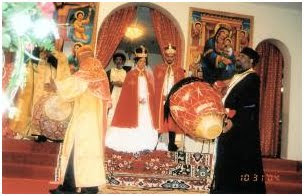“I Do”—A Season of Vows and Reflections on Ethiopian Marriage
Pastor/Priest to the bride: “Do you promise
to love, honor, cherish, and protect him, forsaking all others and holding only
to him forevermore?”
Bride: “I do.”
Indeed, there is a season for
everything under the sun, as the Holy Bible reminds us. And now, the season of
weddings is in full bloom once again. With the fasting season behind us, joyful
couples across Ethiopia are eagerly stepping into one of life’s most profound
journeys—the sacred union of marriage.
It’s that time of year when the
words “I do” echo through churches across the country, especially on weekends
in the months of April and May. These words carry immense emotional and
spiritual weight, spoken before God, family, and community. For many, it is the
fulfillment of months—sometimes years—of dreaming, planning, and hoping.
In Ethiopia, where religious
traditions are deeply woven into social fabric (and often culturally expected),
most weddings take place in churches. A friend once told me, “Marriages are
made in heaven, but celebrated on earth.” How true that is. The wedding
ceremony symbolizes the physical, emotional, and spiritual uniting of two
people, a sacred ritual most fittingly held within a house of worship.
The
Foundation of Society
The institution of marriage holds
significant value—not just for the couple—but for society at large. It forms
the foundation of the family, which, in turn, is the cornerstone of a stable
community. Across cultures, ethnicities, and religions, marriage has remained a
universal tradition. While the customs may differ, the core idea remains the
same: marriage is a bridge between generations, a way to preserve culture, and
a vessel to carry civilization forward.
In Ethiopia, weddings are not just
about two individuals—they often involve the union of two families, or even two
communities. These celebrations are marked by abundant feasting, dancing, and
rituals that may last for days or even weeks, especially in rural areas.
Despite regional and ethnic variations, this collective spirit is something
beautifully Ethiopian.
Shifting
Traditions and Encouraging Progress
That said, times are changing.
Traditional customs—especially arranged marriages—are slowly fading in urban
areas, thanks largely to the spread of modern education and evolving social
attitudes. Early marriage, once widespread, has also shown signs of decline
over the past decade. That’s certainly something to be celebrated.
Arranged marriages were originally
intended to ensure compatibility and harmony, but over time, they took forms
that often stifled personal choice. And while they haven’t completely
disappeared—especially in rural or traditional settings—the shift toward
greater autonomy in choosing a life partner is welcome.
Sometimes, I wonder: is there really
much difference between the old-school arranged marriage and today’s high-tech
matchmaking—dating apps, reality shows, and computer-generated “compatibility
scores”? In both cases, strangers are matched, and hopes are pinned on finding
“the one.” Food for thought.
Time
for Balance
While the progress is promising, we
still have some cultural homework to do. One area of concern is the excessive
spending on weddings. The pressure to host lavish ceremonies has led many
families into financial strain—even conflict—long after the guests have gone
home. In a country where poverty remains a challenge, this extravagance seems
out of place.
Another tradition that’s losing its
authenticity is the shimaglewoch—a respected group of elders sent by the
groom to ask for the bride’s hand. While once a meaningful gesture of respect
and negotiation, it has become more symbolic than substantial. In most cases
today, everyone knows the wedding will go ahead regardless of the elders’
formal request. So why continue the charade?
Don’t get me wrong—I’m not against
traditions. On the contrary, I believe in honoring them. But tradition should
serve people, not the other way around. We must develop the wisdom to know
which practices to preserve and which to evolve.
A
Sacred Commitment
At its core, marriage is one of
life’s greatest commitments. It is both a celebration of love and a solemn
promise. Ethiopia’s transition away from restrictive customs and toward more
balanced, meaningful unions is worth acknowledging. However, let’s not get
swept away by modernity without reflection. The goal isn’t to abandon our
heritage, but to enrich it—choosing what uplifts us and releasing what holds us
back.
So, did I hear someone say, “I do”?
Pastor/Priest: “May the Lord bless you and keep you. May the Lord make
His face shine upon you, and be gracious unto you. May the Lord lift up His
countenance upon you, and give you peace.”
Congratulations. You may now kiss
the bride.





Comments